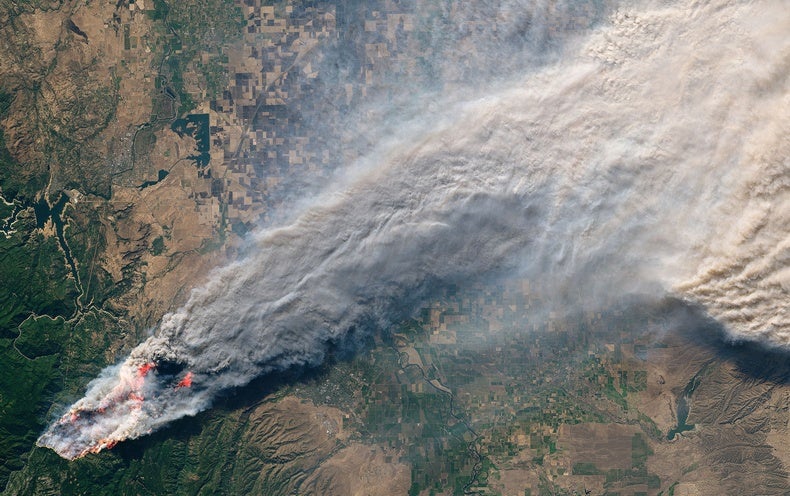Debates inescapably animate the American election circus, watched more for gaffes and missteps than genuine insight into presidential aspirants.
In August, however, the Republican presidential candidates’ debate detoured from the usual litany of empty soundbites into something darker: a collective dismissal of reality. When the eight hopefuls for the presidential nomination were asked to raise their hands if they believed in the reality of human-mediated global warming, every one declined to do so. One candidate, biotech entrepreneur and fossil-fuel stock peddler Vivek Ramaswamy, went even further, slamming the “climate change agenda” as a hoax.
Despite the bluster of the Republican candidates, the incontrovertible fact remains that anthropogenic climate change is real. As swathes of the world swelter and burn and flood, the folly displayed at the debate makes it critical we understand why so many persist in denying reality.
For decades now, the overwhelming scientific consensus has been that we are rapidly altering Earth’s climate, with dangerous consequences. Worldwide, record highs of land and sea temperatures have fueled wildfires from North Europe to South America. Extreme temperatures are no longer an outlier on a planet warmed by 1.2 degrees Celsius since the preindustrial age. In Europe, last years’ record heat wave killed over 61,000 people, setting a temperature record that 2023 has already broken. Entire regions of the world teeter now at the brink of uninhabitability.
Even before the current crisis, this was a catastrophe predicted by basic physics; French polymath Joseph Fourier hypothesized human effects on climate as early as 1824, while the effects of greenhouse gases were demonstrated experimentally by Irish physicist John Tyndall in 1862.
Some argue that climate has always changed throughout Earth’s history. And while that is true, climate has never changed at such an alarming rate. Just as there’s a difference between bringing your car to a halt by gentle application of the brake versus ramming it full tilt into a brick wall, so too should a rapid rate of climate change concern us. Nor can we disavow responsibility by positing that climate change might be a natural phenomenon. The abundance of carbon dioxide in our atmosphere from fossil fuels point to our involvement as surely as the fingerprints on a smoking gun.
And yet, despite all this, a significant portion of the U.S. population denies any human role in climate, or even the existence of climate change itself. Were the problem simple misunderstanding, the solution might be to better elucidate the scientific case. But this well-meaning approach pivots on the assumption that a lack of information is the problem, ignoring an extremely important variable: ideology. Climate change denial in all forms is highly associated with political views. The single strongest predictor of denialism is right-wing ideology, as shown in research for decades. Those with strong free-market and libertarian views are especially prone to reject the facts of climate change.
Climate change confounds a central tenet of libertarian free-market views. Accepting the reality of human-mediated climate change means mitigating action should logically follow. But as free-market beliefs typically entail strong distrust of government or market regulation, climate change poses an ideological challenge. This leaves people with two distinct options: One might carefully reevaluate the boundaries of one’s convictions to incorporate new information and refine their philosophy; this intellectually admirable approach is difficult and cognitively expensive work. Or there is a darker, easier alternative—simply reject the problem, and retreat into naked negation by ignoring evidence and seeking to stymy those pointing out the urgency of the issue.
Such attempts to undermine scientific consensus to preserve belief are what psychologist Leon Festinger called motivated reasoning. As information becomes distorted through a prism of belief, it is reinterpreted to reaffirm existing values, and jettisoned if it contradicts dogma. Under the schema of motivated reasoning, even the weakest information propping up a belief becomes amplified, while strong disconfirming evidence is dismissed. To quote Paul Simon, “All lies and jest / Still the man hears what he wants to hear / And disregards the rest.” On platforms like X (formerly Twitter), hashtags like #ClimateScam pour vicious invective on climate scientists, accusing them of global conspiracy. Such paranoia skirts the fact that such a hypothetical conspiracy would be virtually impossible to maintain, and speaks to desperate attempts to cling to ideology in the face of intrusive reality.
There are other factors at play, beyond loathing of regulation, with men disproportionately in the ranks of denialists. More than this, society has become increasingly politically polarized. While Donald Trump (himself a climate denier) was not present at the debate, his shadow loomed large. As U.S. political polarization widens, Trump’s legacy has thoroughly cast acceptance of climate science into a left-wing position, a form of “wokeism” to be scorned. Denial has been co-opted too by contrarian figureheads, extolled by hucksters whose entire schtick is to define themselves entirely in opposition to the mainstream. Little wonder that exemplars of this genre like Joe Rogan, Russell Brand and Jordan Peterson amplify denialism to huge audiences. Inevitably, climate change denial has been grasped at by the same conspiracy theorists who denied COVID, priding themselves as rejecting “official” narratives. Such unholy alliances of disinformation purveyors reduce our ability to take corrective action.
To combat ideology’s stranglehold on people’s thinking, we must condemn performances like the Republican debate’s climate cattle call for what they are: reckless and self-serving displays of ideology rejecting reality.
The tragedy is that reality does not care one iota for our vainglorious beliefs. The inescapable truth is that anthropogenic climate change is real, and denialism or minimalization condemn us to dangerous inertia when action is urgently needed. And perhaps most cruelly, this pigheaded hubris hurts the most vulnerable the most. It is the world’s poorest, who bear the least responsibility for the crisis, who are most harmed. Already they are dying from the ravages of climate change, with wet-bulb temperatures at which human survival is possible already being exceeded across the world. As Republican candidates preen, the haunting truth is their arrogance condemns innocents to early deaths. As the world braces for more and more disasters, we cannot allow ideology to triumph over evidence.
This is an opinion and analysis article, and the views expressed by the author or authors are not necessarily those of Scientific American.
































